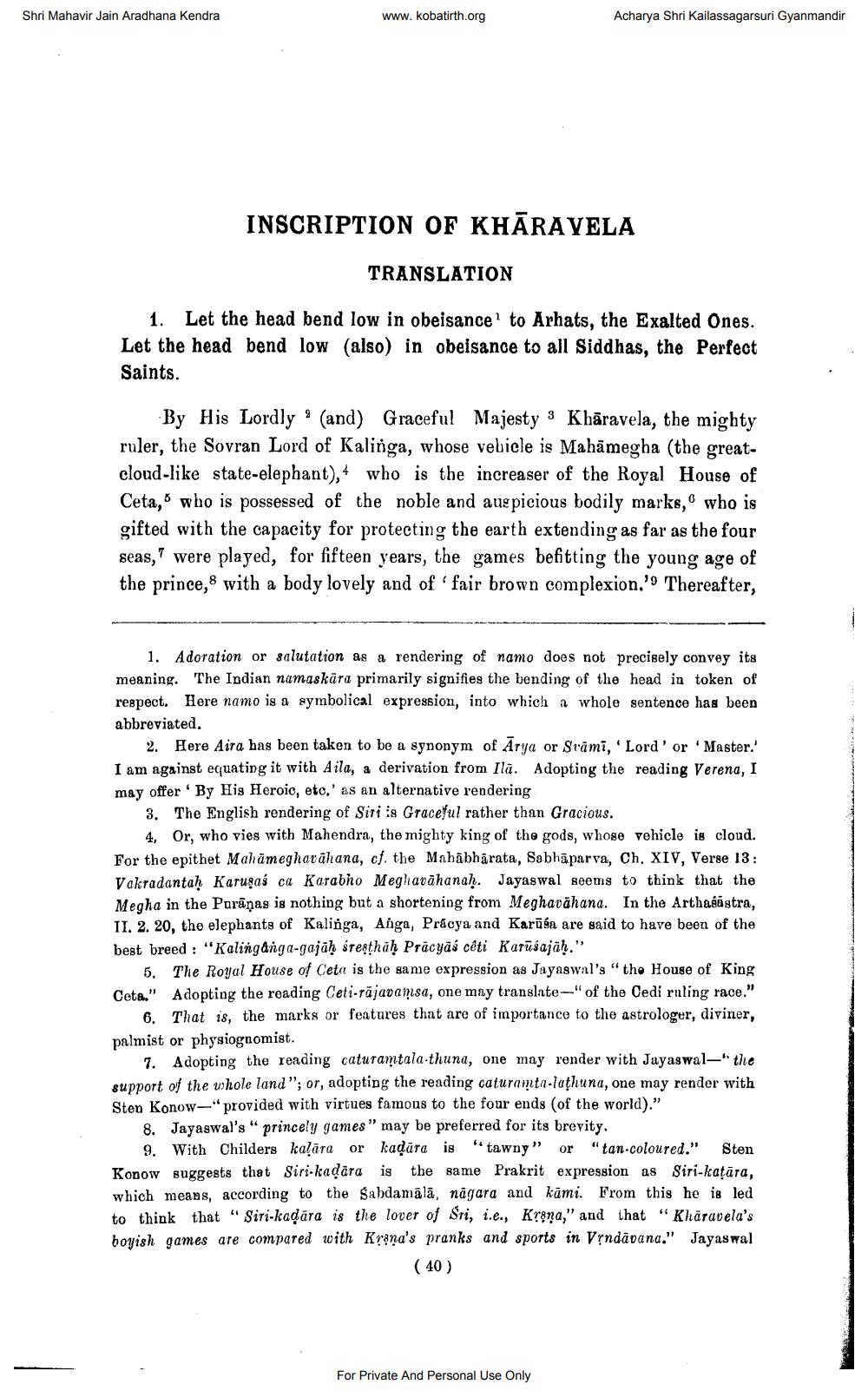________________
Shri Mahavir Jain Aradhana Kendra
www.kobatirth.org
Acharya Shri Kailassagarsuri Gyanmandir
INSCRIPTION OF KHĀRAVELA
TRANSLATION
1. Let the head bend low in obeisance to Arhats, the Exalted Ones. Let the head bend low (also) in obeisance to all Siddhas, the Perfect Saints.
By His Lordly' (and) Graceful Majesty 3 Khāravela, the mighty ruler, the Sovran Lord of Kalinga, whose vebicle is Mahāmegha (the greatcloud-like state-elephant), who is the increaser of the Royal House of Ceta, who is possessed of the noble and auspicious bodily marks, who is gifted with the capacity for protecting the earth extending as far as the four seas, were played, for fifteen years, the games befitting the young age of the prince,8 with a body lovely and of fair brown complexion.'! Thereafter,
1. Adoration or salutation as a rendering of namo does not precisely convey its meaning. The Indian namaskāra primarily signifies the bending of the head in token of respect. Here namo is a symbolical expression, into which a whole sentence has been abbreviated.
2. Here Aira has been taken to be a synonym of Ārya or Srämi, Lord' or 'Master.' I am against equating it with Aila, a derivation from Ilā. Adopting the reading Verena, I may offer By His Heroio, etc.' as an alternative rendering
3. The English rendering of Siri is Graceful rather than Gracious.
4, Or, who vies with Mahendra, the mighty king of the gods, whose vehicle is cloud. For the epithet Mahämeghaváhana, cf. the Mahabharata, Sabhāparva, Ch. XIV, Verse 13 : Vakradantah Karugas ca Karabho Meghavāhanah. Jayaswal seems to think that the Megha in the Parānas is nothing but a shortening from Meghavähana. In the Arthasastra, II. 2. 20, the elephants of Kalinga, Aiga, Pracya and Karūsa are said to have been of the best breed: "Kalinganga-gajāḥ śresthah Pracyäś cêti Karūsajäh."
5. The Royal House of Ceta is the same expression as Jayaswal's "the House of King Ceta." Adopting the reading Ceti-tājavamsa, one may translate" of the Cedi rnling race."
6. That is, the marks or features that are of importance to the astrologer, diviner, palmist or physiognomist.
7. Adopting the reading caturamtala.thuna, one may render with Jayaswal-"the support of the whole land"; or, adopting the reading caturama-lathuna, one may render with Sten Konow-"provided with virtues famous to the four ends of the world)."
8. Jayagwal's "princely games" may be preferred for its brevity,
9. With Childers kaļāra or kaļāra is "tawny" or "tan-coloured." Sten Konow suggests that Siri-kadara is the same Prakrit expression as Siri-katāra, which means, according to the Sabdamālā, nāgara and kami. From this he is led to think that " Siri-kadāra is the lover of Sri, i.e., Krona," and that "Kharavela's boyish games are compared with Krana's pranks and sports in Vindāvana." Jayaswal
( 40 )
For Private And Personal Use Only




